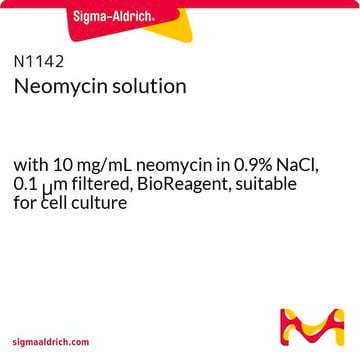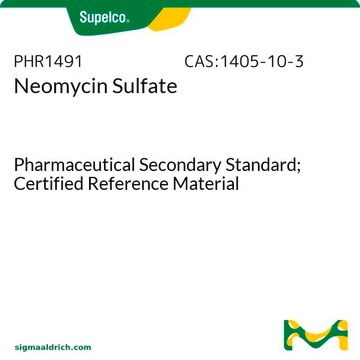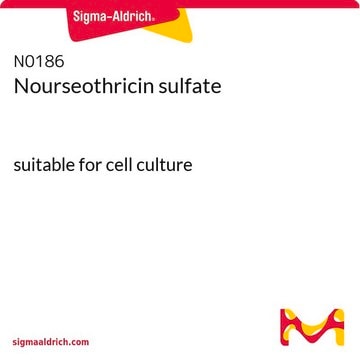N3144
Neomycin trisulfate salt hydrate
suitable for plant cell culture
About This Item
Recommended Products
form
powder
Quality Level
technique(s)
cell culture | plant: suitable
antibiotic activity spectrum
Gram-negative bacteria
Gram-positive bacteria
application(s)
agriculture
Mode of action
protein synthesis | interferes
SMILES string
O.OS(O)(=O)=O.OS(O)(=O)=O.OS(O)(=O)=O.NC[C@@H]1O[C@H](O[C@H]2[C@@H](O)[C@@H](O[C@@H]2CO)O[C@@H]3[C@@H](O)[C@H](N)C[C@H](N)[C@H]3O[C@H]4O[C@H](CN)[C@@H](O)[C@H](O)[C@H]4N)C(N)[C@@H](O)[C@@H]1O
InChI
1S/C23H46N6O13.3H2O4S.H2O/c24-2-7-13(32)15(34)10(28)21(37-7)40-18-6(27)1-5(26)12(31)20(18)42-23-17(36)19(9(4-30)39-23)41-22-11(29)16(35)14(33)8(3-25)38-22;3*1-5(2,3)4;/h5-23,30-36H,1-4,24-29H2;3*(H2,1,2,3,4);1H2/t5-,6+,7-,8+,9-,10-,11?,12+,13-,14-,15-,16-,17-,18-,19-,20-,21-,22-,23+;;;;/m1..../s1
InChI key
WHAGUNPVKDUVFV-QGTTWHFQSA-N
Looking for similar products? Visit Product Comparison Guide
General description
Application
Biochem/physiol Actions
Antimicrobial spectrum: Neomycin acts against both gram-positive and gram-negative bacteria.
Caution
Preparation Note
Signal Word
Danger
Hazard Statements
Precautionary Statements
Hazard Classifications
Resp. Sens. 1 - Skin Sens. 1
Storage Class Code
11 - Combustible Solids
WGK
WGK 3
Flash Point(F)
Not applicable
Flash Point(C)
Not applicable
Choose from one of the most recent versions:
Already Own This Product?
Find documentation for the products that you have recently purchased in the Document Library.
Customers Also Viewed
Articles
Antibiotic kill curve is a dose response experiment in which mammalian cells are subjected to increasing amounts of selection antibiotic
Antibiotic kill curve is a dose response experiment in which mammalian cells are subjected to increasing amounts of selection antibiotic
Antibiotic kill curve is a dose response experiment in which mammalian cells are subjected to increasing amounts of selection antibiotic
Antibiotic kill curve is a dose response experiment in which mammalian cells are subjected to increasing amounts of selection antibiotic
Our team of scientists has experience in all areas of research including Life Science, Material Science, Chemical Synthesis, Chromatography, Analytical and many others.
Contact Technical Service








